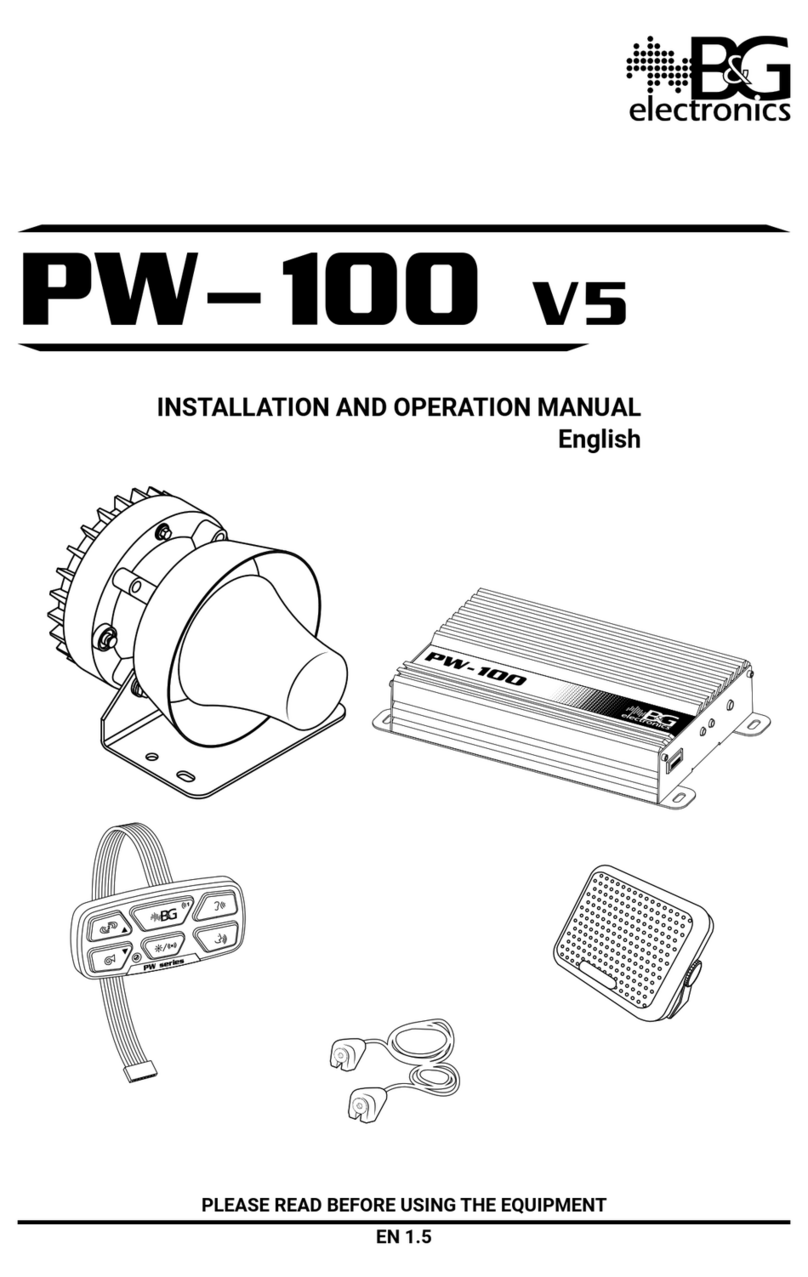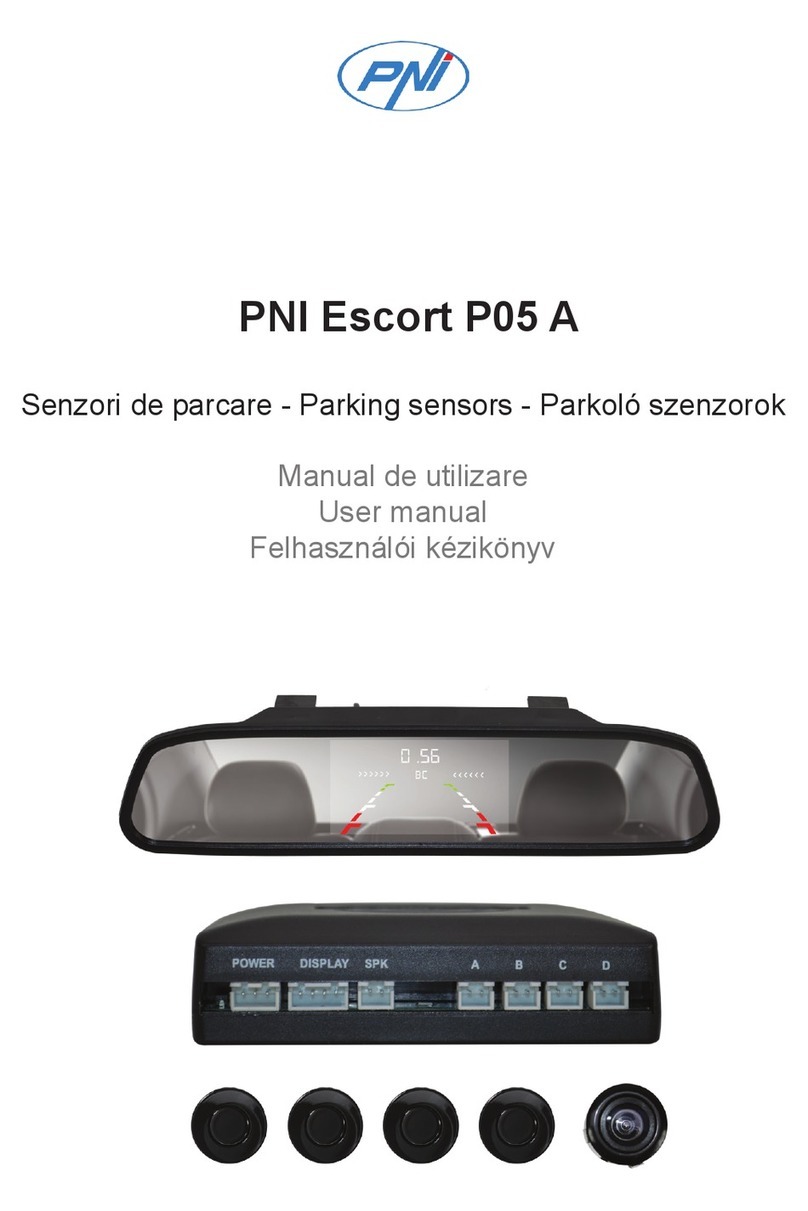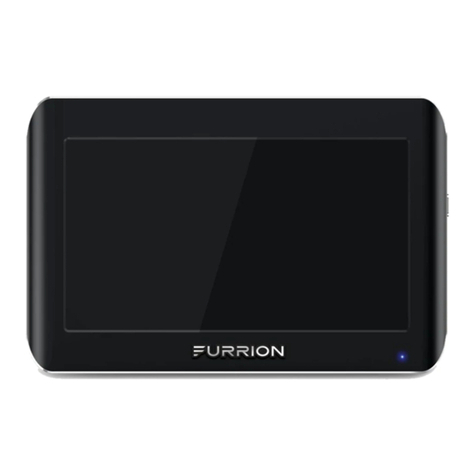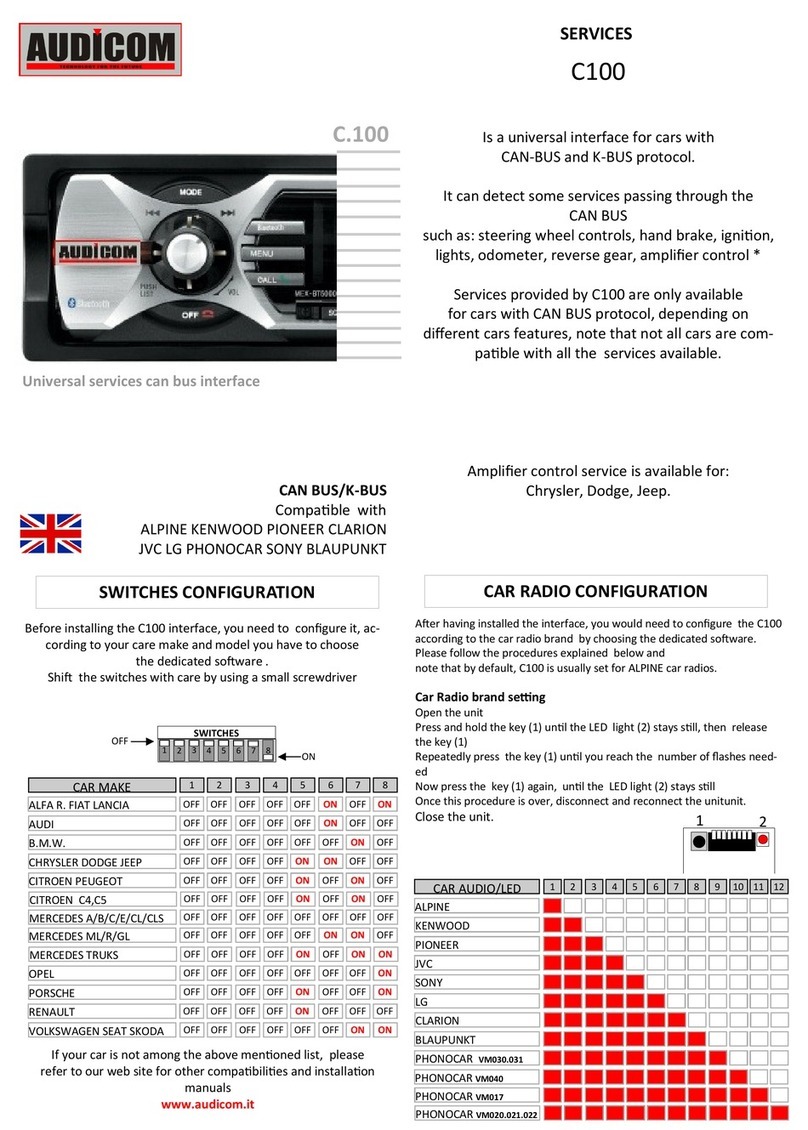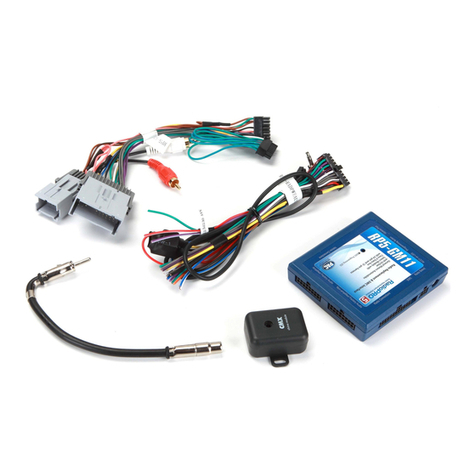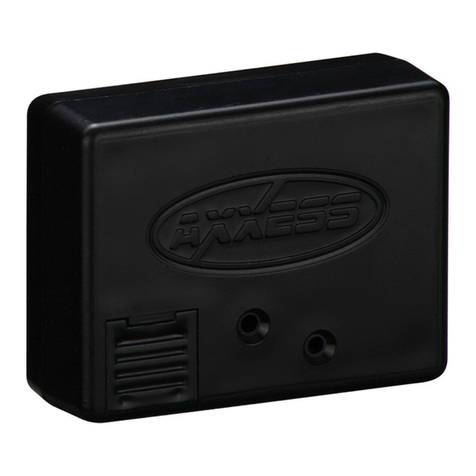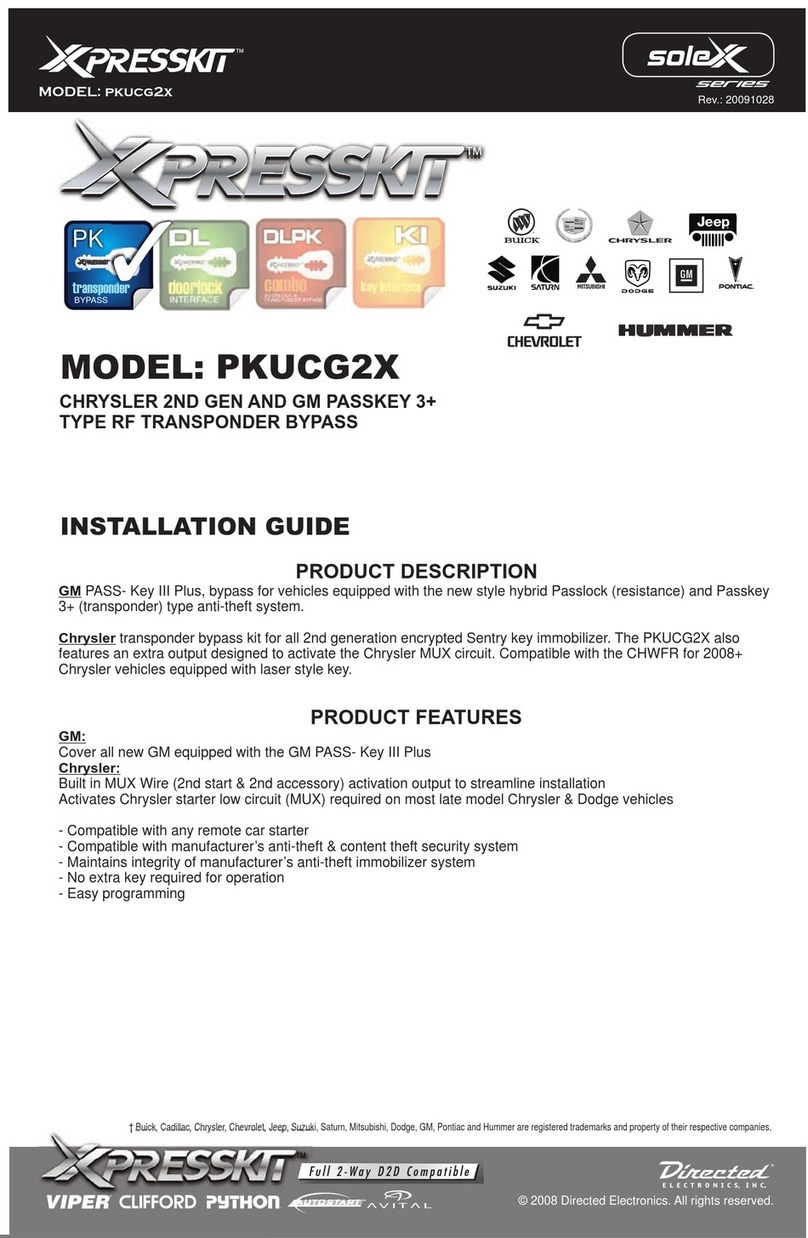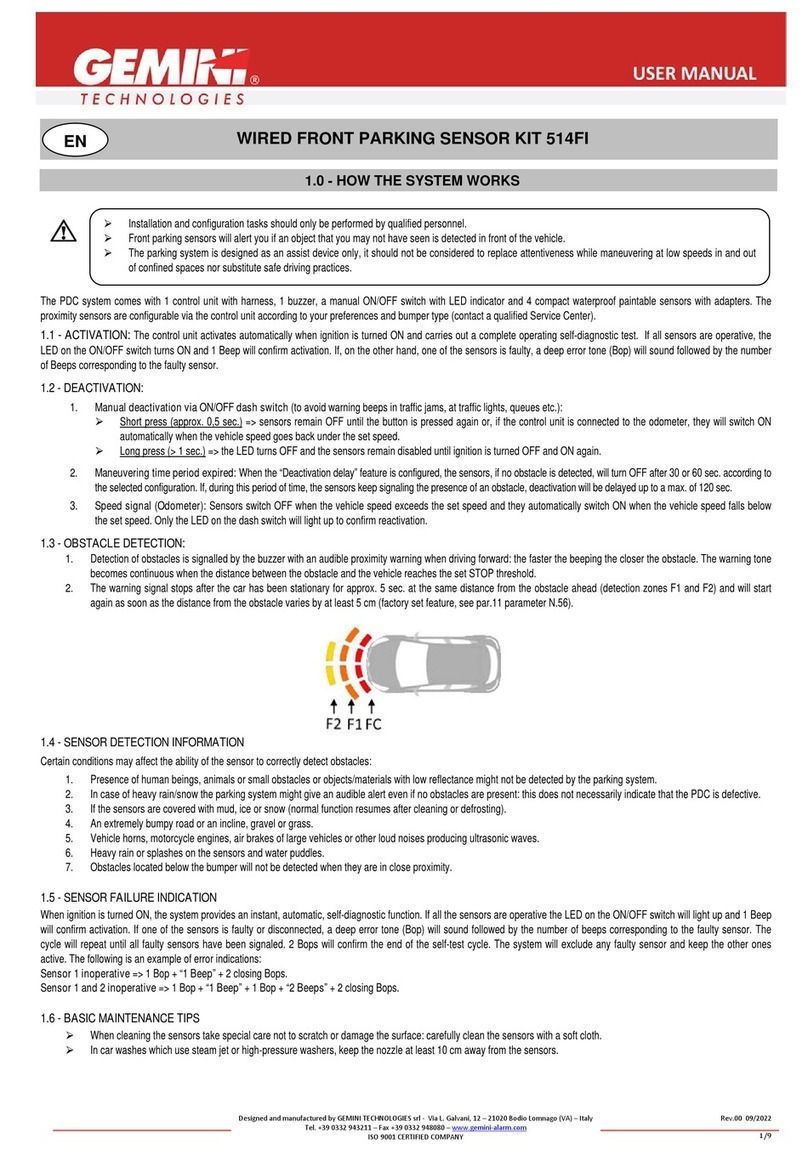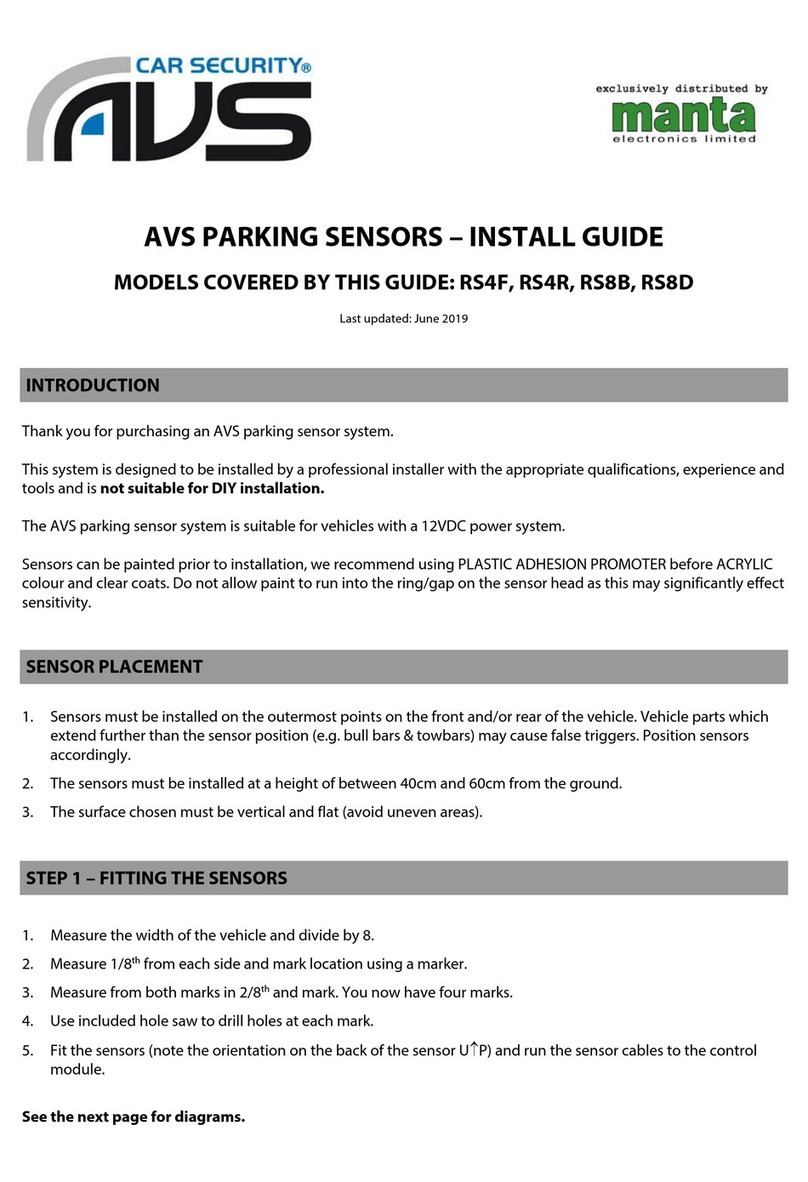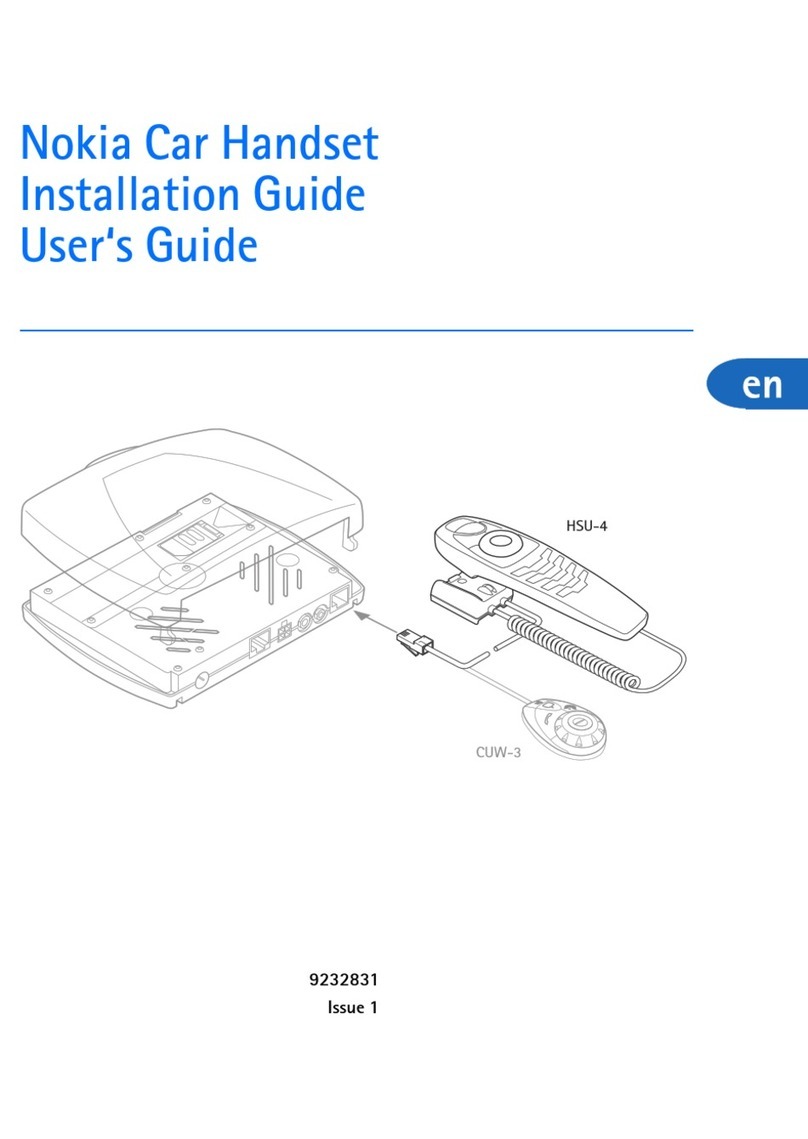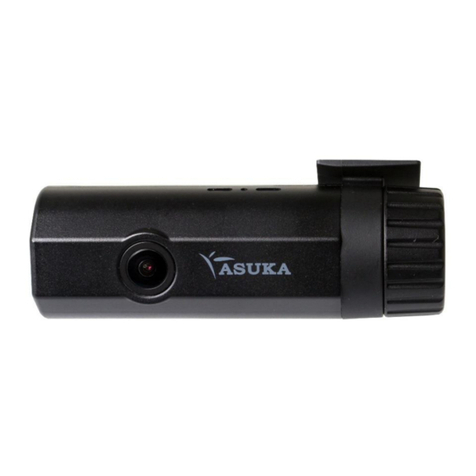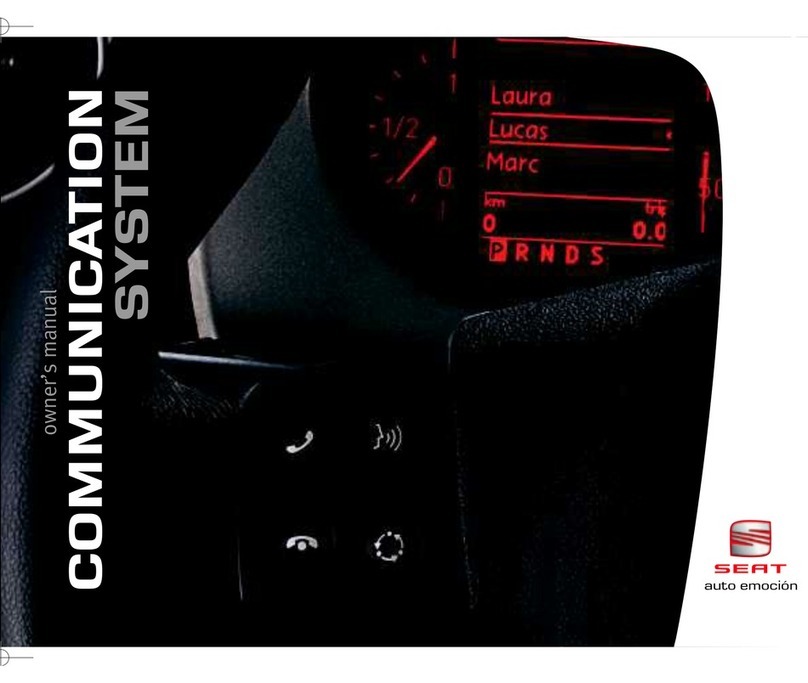B&G electronics PW-100 User manual

PW-100 V5.1
PLEASE READ BEFORE USING THE EQUIPMENT
EN 1.6
INSTALLATION AND OPERATION MANUAL
English
INTERCOM SYSTEM FOR PUBLIC SAFETY AND STEALTH
ARMORED VEHICLES.

PW-100 V5.1 2
PW-100 V5.1 2
COMPONENTS AND RECOMMENDED LOCATIONS IN THE VEHICLE
(1) Electronic unit
(1) Digital keyboard & internal microphone
(1) 100W loudspeaker
(2) External microphones
(1) Internal speaker
(1) Keyboard harness
(1) Power cable (battery)
(1) Fuse 15A
(1) Speaker extension cables
(1) Loudspeaker and auxiliary load harness
DIGITAL KEYBOARD
& INTERNAL MIC
ELECTRONIC UNIT
PW-100
EXTERNAL MIC
EXTERNAL MICINTERNAL SPEAKER
100W
LOUDSPEAKER
INSTALLATION AND ELECTRIC DIAGRAM
To install the equipment, see the wiring diagram shown further on.
Avoid leaving visible cables in the cabin to leave the vehicle’s aesthetics unaffected.
If there are any cables left disconnected, insulate them with tape; disconnected cables
making an undesired contact can cause a malfunction.
Electronic Unit
Place it on a hidden location for aesthetic purposes. Make sure that the
location allows some ventilation into the unit to avoid overheating.
Digital Keyboard
To facilitate the handling of the equipment, place the keyboard on a location
within the driver’s reach, such as the console of the vehicle. To ensure an
adequate adherence, clean the surface where the keyboard is to be sticked.
Remove the protective liner from the adhesive pad in the back side and stick
it to the surface.
To clean the keyboard, gently wipe it with a dry cloth. Do not use water or any
solvent.
Loudspeaker
When selecting the location for the loudspeaker, keep in mind that
this component is weather resistant but it is not immersion-proof. The
loudspeaker must be placed as far as possible from the keyboard (where the
internal microphone is) to prevent feedback.
Splice and tape the loudspeaker wires to the output wires (they have no
polarity).
External Microphones
Two locations are recommended for installation, as explained on the next
page.
Internal Speaker
Place the speaker out of view, without affecting the sound.
EXTERNAL MICROPHONES INSTALLATION INSTRUCTIONS
Each microphone includes a shell to hold it in
place and protect it from outdoor. Depending
on the installation procedure, it can be more
convenient to assemble microphone and shell
either before or after the wiring.
For instance, if the wiring requires to pull
the cable through a narrow space, it is
recommended to assemble after wiring.
Shell
Microphone
Mounting
tape

PW-100 V5.1 3
PW-100 V5.1 3
Microphone + shell assembly procedure
1.Insert the cable in the shell by pressing it with your fi nger. 2.Push the microphone into the shell (do not pull the cable!).
3.Remove the liner from the tape and stick it to the shell. 4.Stick the shell on the selected surface, previously cleaned
with alcohol.
Recommended locations to install the microphones
There are two recommended locations in the vehicle
(see fi gure to the left), they differ with regard to ease
of installation and audio reception volume.
You can select a location according to your
preferences.
Location A
Inside the rearview mirror.
This location offers the highest
volume yet the most time
consuming installation, as it
requires to take parts of the
vehicle apart.
Location B*
In the gap of the front doors.
Select a surface to place the
microphone, so that it faces to
the exterior from inside the gap.
Once the surface is selected,
the installation is fairly easy.
* WARNING!
On location B, place the
microphone slightly
downward to prevent
damage from water
clogging.

Red
Black
Grey
White
EXTERNAL MIC
(L - R)
EXTERNAL
LOUDSPEAKER
BATTERY
+ 12 V
Grey
INTERNAL SPEAKER
DIGITAL
KEYBOARD
WIRING DIAGRAM
PW-100
WARNING!
Gently handle the wires during the installation; pressing or forced bending of the wires can cause internal damage and subsequent malfunction.
Avoid placing the wires near from noise sources such as alternators, high tension wires, etc.
If there are any cables left disconnected, insulate them with tape; disconnected cables making an undesired contact can cause malfunction.
Do not manipulate the loudspeaker terminals.
1
Splice and tape the loudspeaker wires to the output wires (they have no polarity).
1
1
AUXILIARY
LOAD
BATTERY
+ 12 V

PW-100 V5.1 5
PW-100 V5.1 5
OPERATING PROCEDURES
All of the equipment’s functions are managed through a six button keyboard (see fi gure
below). Press the buttons with your fi ngertips, do not use objects to press them.
MIC
Volume DOWN
PTT
HORN
Manual WAIL INTER
SIRENVolume UP
AUX
ACTIVATING FUNCTIONS
Intercom* Siren - SIREN tone
ON: press & release
OFF: press &
release
ON: press & release
OFF: press & release
INTER enables the hearing exterior sounds
through the internal speaker.
If during 5 minutes the equipment does
not detect any activity, INTER function
turns off (Automatic Shut Down, ASD).
Activates the reproduction of the tone
selected for SIREN.
Public Address “PA”* Auxiliary
ON: press & hold
OFF: release
ON: press & release
OFF: press & release
PTT allows the driver to communicate
to the exterior through the keypad
microphone.
For a more private communication (lower
exterior volume: PTT/INTER), press PTT
while in INTER mode. For a more public
communication (louder exterior volume:
PTT/PA), press PTT while in SIREN, AUX
SIREN or stand-by (with INTER off) mode.
Both volumes are set following the same
keypad procedure.
AUX function either turns on an auxiliary
siren tone “AUX SIREN” or activates an
auxiliary load “AUX LOAD”, depending on
the subfunction assigned to it.
Siren - WAIL tone Siren - HORN tone
ON: press & hold
OFF: release
ON: press & hold
OFF: release
Activates the reproduction of the WAIL
siren tone.
Activates the reproduction of the HORN
tone.
If acoustic feedback occurs while INTER or PTT are on, AFC (Automatic Feedback Control) will trigger to prevent
feedback. AFC is further explained ahead in this manual.
*

PW-100 V5.1 6
PW-100 V5.1 6
SIREN tone selection
SIREN function allows to choose among 5 different tones: WAIL, Hi-Lo, PHASER, CHIRP,
and YELP.
1.Activate SIREN. 2.While SIREN is sounding press WAIL repeatedly to switch to the
available tones (WAIL, Hi-Lo, Phaser, CHIRP and YELP).
AUX SIREN tone selection
With AUX set to AUX SIREN, it is possible to select the AUX SIREN tone to one of the
available tones (WAIL, Hi-Lo, PHASER, CHIRP or YELP).
It is not possible to set the same tone for both SIREN and AUX SIREN, meaning that while
setting AUX SIREN, the SIREN tone in use will be unavailable; also, if the AUX SIREN tone is
selected for SIREN, AUX SIREN’s tone will automatically change.
1.Activate AUX SIREN. 2.While AUX SIREN is sounding press WAIL repeatedly to switch
to the available tones (WAIL, Hi-Lo, Phaser, CHIRP and YELP).
NOTE: WAIL does not sound when SIREN/AUX SIREN is on.
SETTING UP FUNCTIONS
Setting up HORN tone
The default tone is Standard HORN, although the equipment allows to choose between
Standard HORN and B&G HORN, as explained below.
1.Press and hold HORN. 2.While HORN is held, press and hold
SIREN until the tone changes.
3.To change tone again, repeat steps
1 & 2.
Setting up AUX
AUX allows to either play an auxiliary siren tone, or change the activation state of an
auxiliary load up to 15 A (useful to control a light set or other devices). If AUX LOAD is
active, the keypad starts to fl ash once per 8 sec.
1.Press and hold AUX.
If it beeps once or twice, it’s set to AUX
LOAD.If siren stops & restarts, it’s set
to AUX SIREN.
2.Press SIREN to switch among AUX LOAD and
AUX SIREN.
If it beeps once or twice, it’s set to AUX LOAD.If
siren stops & restarts, it’s set to AUX SIREN.
3.Press AUX to fi nish setup.
Upon fi nishing beeps twice.
Setting up AUX LOAD
With AUX set to AUX LOAD, it is possible to set AUX LOAD in a way that it gets activated
together with SIREN (for instance, that when SIREN sounds, a light set associated to AUX
LOAD turns on)*, in addition to the activation by pressing AUX.
1.Press and hold AUX until you hear
1 beep.
2.Press HORN to switch AUX LOAD mode.
If it beeps once, it’s set to independent.
It it beeps twice, it turns on with SIREN.
3.Press AUX to fi nish setup.
*By default, AUX LOAD is set to activate independently from SIREN.

PW-100 V5.1 7
PW-100 V5.1 7
Setting the volume of the internal speaker, “internal volume”
1.While INTER is on, press and hold
INTER.
2.While INTER is held, press WAIL to
increase volume.
3.While INTER is held, press HORN to
decrease volume.
External Volume Auto-Adjustment (VAA)
In addition to the manual adjustment, the equipment is capable of detecting the vehicle’s
level of acoustic isolation and adjust the maximum external volume accordingly.
To perform this procedure, close all of the vehicle’s doors and windows, and follow the
steps explained below.
To cancel the procedure, press PTT.
1.Press and hold PPT.
Remain silent during the procedure.
2.While PTT is held, press INTER.
Release both upon hearing a beep.
3.Wait up to 30 s, the equipment will
beep 2 times when VAA has fi nalized.
Setting the volume of the external loudspeaker, “external volume”
1.Press and hold PTT. 2.While PTT is held, press WAIL to
increase volume.
3.While PTT is held, press HORN to
decrease volume.
NOTE: If INTER is on, PTT/INTER volume will adjust. If INTER is off, PTT/PA volume will
adjust.
Enabling Hidden Siren Function
The equipment allows to silence the siren sounds, meaning that when this function has
been enabled and activated, the pressing of any of the siren buttons (SIREN, WAIL, HORN,
AUX SIREN) will not yield a response.
1.To switch between both states, press simultaneously
WAIL, HORN, AUX, SIREN, and hold for 5 s.
2.If it beeps 1 time, Hidden Siren is enabled.
If it beeps 2 times, Hidden Siren is disabled.
Activating / Deactivating Hidden Siren
Once Hidden Siren has been enabled, it is possible to activate it to effectively silent all
sirens, and deactivate to return all sirens to normal function.
1.To activate Hidden Siren, press and
hold INTER.
2.While INTER is held, press and hold
PTT until keyboard’s backlights blink.
3.Sirens will now be silenced.
1.To deactivate Hidden Siren, simultaneously press and hold
WAIL and HORN until keyboard’s backlights blink.
2.Sirens will now sound.

PW-100 V5.1 8
PW-100 V5.1 8
AUTOMATIC FEEDBACK CONTROL (AFC)
If acoustic feedback would occur while PTT or INTER are on (caused, for instance, by the
opening of a door or window), the equipment will detect and automatically fi x the issue by
decreasing the volume. After the event takes place, the equipment will attempt to rise the
volume back to the level defi ned by the user, as long as AFC is not triggered again.
ENERGY SAVING FEATURES (Automatic Shut Down, ASD)
Partial Shut Down (PSD)
The equipment constantly tracks the incoming voltage status. If the incoming voltage
is below 13Vdc, after 20 seconds of inactivity the equipment activates PSD mode. This
change is indicated by the turning off the keyboard’s backlights. While on PSD mode, upon
pressing any key the respective function will execute normally and the equipment will
return to normal energy consumption mode.
Total Shut Down (TSD)
If the incoming voltage is below 11 Vdc, after 60 seconds the equipment will automatically
shut down any function and auxiliary load. While on TSD, upon pressing any key the
backlights will blink 3 times and the function controlled by the pressed key will not execute.
Once the equipment detects that the incoming voltage exceeds 13VDC again, the
equipment will return to its normal operation.
TECHNICAL SPECIFICATIONS
DIMENSIONS
Electronic Unit 37 x 109 x 198 mm 1.5’’ x 4.3’’ x 7.8’’
Loudspeaker 133 x 204 x 155 mm 5.2’’ x 8.0’’ x 6.1’’
Digital Keyboard 25 x 7 x 5.4 mm 1.0’’ x 0.3’’ x 2.1’’
Internal Speaker 80 x 56 x 95 mm 3.2’’ x 2.2’’ x 3.7’’
INPUT VOLTAGE 11.5 - 14.8 Vdc
INPUT CURRENT 6.8 Amps @ 13.6 Vdc (100W Loudspeaker)
STAND BY CURRENT <25 mA
AUDIO FREQUENCY 330Hz - 5600 kHz
OUTPUT POWER 93W RMS - 8 Ohm
SIREN FREQUENCY 440 - 1750 Hz
LOW VOLTAGE
SHUTDOWN If voltage drops below 11 V for 60 seconds or longer, the equipment will
cease to work and resume operation when system voltage exceeds 13V
MAX. LOAD 10 A
B&G ELECTRONICS
ONE YEAR LIMITED WARRANTY
B&G Electronics guarantees that this product leaves the factory free from defects related to materials
and manufacturing. If for any reason a failure related to materials and manufacturing were to occur
during the period of one year after the date of purchase, B&G Electronics would repair or replace the
failing equipment free of charge.
This warranty shall be voided if the product is modifi ed, tampered with, misused, or subjected to
abnormal working conditions. This warranty does not cover physical damage to the product surface.
This warranty does not apply when the malfunction results from the use of this product in conjunction
with accessories, other products, or peripheral equipment not designed by B&G Electronics.

PW-100 V5.1
FAVOR LEER ESTE MANUAL ANTES DE USAR EL EQUIPO
ES 1.6
MANUAL DE INSTALACIÓN Y OPERACIÓN
Español
SISTEMA DE INTERCOMUNICADOR Y SIRENAS PARA
VEHÍCULOS BLINDADOS.

PW-100 V5.1 10
PW-100 V5.1 2
COMPONENTES Y UBICACIÓN DENTRO DEL VEHÍCULO
(1) Unidad electrónica
(1) Teclado digital de control y micrófono interno
(1) Bocina de 100W
(2) Micrófonos externos
(1) Parlante interno
(1) Arnés de teclado
(1) Arnés de potencia (batería)
(1) Fusible 15A
(1) Cable de salida del parlante
(1) Arnés de bocina y carga auxiliar
TECLADO DIGITAL
Y MICRÓFONO INTERNO
UNIDAD ELECTRÓNICA
PW-100
MICRÓFONO EXTERNO
MICRÓFONO EXTERNOPARLANTE INTERNO
BOCINA
100W
INSTALACIÓN Y DIAGRAMA ELÉCTRICO
Para instalar el equipo consulte el diagrama de conexiones mostrado más adelante.
Evite dejar cables visibles dentro de la cabina que afecten la estética del vehículo.
En caso de que queden cables desconectados, aísle los cables con cinta eléctrica; cables
desconectados que hagan contactos no deseados podrían provocar fallas en el equipo.
Unidad Electrónica
Debe ubicarse en un sitio oculto por motivos estéticos. Asegúrese de elegir
una ubicación con sufi ciente ventilación para evitar sobrecalentamiento.
Teclado Digital
Para facilitar el manejo del equipo, ubique el teclado en un sitio al alcance
de la mano del conductor. Limpie la superfi cie donde se ubicará el teclado
para asegurar una adecuada adherencia. Retire la película de protección de
la cinta adhesiva ubicada al respaldo y fi je a la superfi cie elegida.
Para realizar la limpieza del teclado, frote suavemente con un paño seco. No
utilice agua ni solventes sobre el teclado.
Bocina
Al elegir la ubicación para la bocina tenga en cuenta que este componente
resiste a la intemperie pero no a la inmersión. La bocina debe ubicarse lo
más lejos posible del teclado (donde se encuentra el micrófono interno)
para evitar la realimentación.
Empalme y encinte los cables de la bocina con los cables de salida (no
tienen polaridad).
Micrófonos externos
Se recomiendan dos ubicaciones para su instalación, en la siguiente página
se explican en detalle.
Parlante Interno
Procure ubicar el parlante fuera de la vista sin que se afecte el sonido.
INSTRUCCIONES DE INSTALACIÓN PARA LOS MICRÓFONOS EXTERNOS
Cada micrófono incluye una carcasa
para sujetarlo en su sitio y protegerlo
de la intemperie. Dependiendo del
proceso de instalación, puede ser más
conveniente ensamblar micrófono y
carcasa antes o después de cablear.
Por ejemplo, si el cableado requiere
pasar el cable por un espacio estrecho,
se recomienda ensamblar después
del cableado.
Carcasa
Micrófono
Cinta
adhesiva

PW-100 V5.1 11
PW-100 V5.1 3
Ensamblaje micrófono + carcasa
1.Inserte el cable en la carcasa presionando con el dedo. 2.Empuje el micrófono dentro de la cacasa (¡no tire el cable!).
3.Retire el protector de la cinta y pegue la cinta a la carcasa. 4.Pegue a la superfi cie seleccionada, limpiada previamente
con alcohol.
Ubicaciones recomendadas para instalar los micrófonos
Se recomiendan dos puntos en el vehículo (ver fi gura a la
izquierda), se diferencian con respecto a la facilidad de
instalación y el volumen de recepción de sonido.
Puede elegir una ubicación de acuerdo a sus
preferencias.
Ubicación A
Dentro del espejo retrovisor.
Esta ubicación ofrece el mayor
volumen pero el tiempo de
instalación más largo, ya que
requiere desarmar partes del
vehículo.
Ubicación B*
En la ranura de la puerta frontal.
Elija una superfi cie para ubicar
el micrófono, de tal forma que
éste apunte al exterior desde
dentro de la ranura. Una vez
seleccionada la superfi cie, la
instalación es bastante fácil.
* ¡ADVERTENCIA!
Ubique micrófono levemente
inclinado para prevenir
daños provocados por
acumulación de agua

Rojo
Negro
Gris
Blanco
MICRÓFONOS
EXTERNOS (L - R)
BOCINA
EXTERIOR
BATERÍA
+ 12 V
Gris
PARLANTE INTERNO
TECLADO
DIGITAL
DIAGRAMA DE CONEXIONES
PW-100
¡ADVERTENCIA!
Manipule los cables con cuidado durante la instalación; presionar o doblar forzadamente los cables podría causar daños internos y ocasionar fallos.
Evite ubicar los cables cerca de fuentes de ruido como alternadores, cables de alta tensión, etc.
Si algún cable quedara desconectado, aísle el cable con cinta. Cables sueltos haciendo contactos indeseados podrían ocasionar fallos.
No manipule las borneras de la bocina.
1
Empalme y encinte los cables de la bocina con los cables de salida (no tienen polaridad).
1
1
AUXILIARY
LOAD
BATTERY
+ 12 V

PW-100 V5.1 13
PW-100 V5.1 5
FUNCIONAMIENTO
Las funciones del equipo se manejan a través de un teclado de seis botones (ver fi gura
debajo). Presione los botones con las yemas de los dedos, no use objetos para presionar
los botones.
MIC
Bajar volumen
PTT
HORN
INTER
SIRENSubir volumen
AUX
Manual WAIL
ACTIVACIÓN DE FUNCIONES
Intercomunicador* Sirena - tono SIREN
ENCENDER:
pulsar y soltar
APAGAR:
pulsar y soltar
ENCENDER:
pulsar y soltar
APAGAR:
pulsar y soltar
La función INTER permite escuchar los
sonidos del exterior a través del parlante
interno. Si no se detecta actividad durante 5
minutos, INTER se apaga automáticamente
(Automatic Shut Down, ASD).
Activa la reproducción del tono SIREN
elegido.
Perifoneo “PA”* Auxiliar
ENCENDER:
mantener
presionado
APAGAR: soltar
ENCENDER:
pulsar y soltar
APAGAR:
pulsar y soltar
PTT permite al conductor comunicarse con
el exterior a través del micrófono del teclado.
Para una comunicación más privada (menor
volumen externo: PTT/Inter), oprima PTT
estando en INTER. Para una comunicación
más pública (mayor volumen externo: PTT /
PA)oprimaPTTestandoenSIREN,AUXSIRENo
stand-by (es decir, con inter apagado).
Ambos volúmenes se confi guran siguiendo
el mismo procedimiento de teclado.
Dependiendo de la función que se le haya
asignado, AUX activa ya sea el tono de
sirena “AUX SIREN”, o la carga auxiliar
“AUX CARGA”.
Sirena - tono WAIL Sirena - tono HORN
ENCENDER:
mantener
presionado
APAGAR: soltar
ENCENDER:
mantener
presionado
APAGAR: soltar
Activa la reproducción del tono WAIL. Activa la reproducción del tono HORN.
Si se presentara realimentación acústica cuando INTER o PTT están activos, AFC (Automatic Feedback Control)
se activará para prevenir la realimentación. AFC se explica en mayor detalle más adelante.
*

PW-100 V5.1 14
PW-100 V5.1 6
Selección del tono SIREN
La función SIREN permite elegir 5 tonos diferentes: WAIL, Hi-Lo, PHASER, CHIRP y YELP.
1.Active SIREN. 2.Mientras suena SIREN pulse WAIL repetidamente para cambiar
entre los tonos disponibles (WAIL, Hi-Lo, PHASER, CHIRP Y YELP)
Selección del tono AUX SIREN
Una vez establecido AUX SIREN como función AUX, es posible seleccionar el tono para
AUX SIREN entre los tonos disponibles (WAIL, Hi-Lo, PHASER, CHIRP o YELP).
No es posible seleccionar el mismo tono para SIREN y AUX SIREN, esto signifi ca que al
estar eligiendo AUX SIREN el tono activo en SIREN no estará disponible; del mismo modo,
si el tono AUX SIREN es seleccionado para SIREN, el tono AUX SIREN cambia.
1.Active AUX SIREN. 2.Mientras suena AUX SIREN pulse WAIL repetidamente para cambiar
entre los tonos disponibles (WAIL, Hi-Lo, PHASER, CHIRP Y YELP)
NOTA: WAIL no emite ningún sonido cuando SIREN/AUX SIREN está encendido.
CONFIGURACIÓN DE FUNCIONES
Confi guración del tono HORN
El tono por defecto es HORN Estándar, aunque el equipo permite elegir entre HORN
Estándar y HORN B&G, como se explica a continuación.
1.Pulsar y sostener HORN. 2.Teniendo HORN pulsado, pulsar y
sostener SIREN hasta que el tono cambie.
3.Para cambiar el tono nuevamente,
repita los pasos 1 y 2.
Confi guración de AUX
AUX permite, ya sea usar un tono auxiliar de sirena, o cambiar el estado de activación de
una carga auxiliar hasta 15 A (útil para controlar un set de luces o un equipo adicional). Si
la carga auxiliar está activada, el teclado parpadea 1 vez cada 8 seg.
1.Pulsar y sostener AUX.
Si suena 1 o 2 beeps: quedó en AUX CARGA.
Sirena pausa y reinicia: quedó en AUX SIREN.
2. Pulsar SIREN para cambiar entre CARGA y SIREN.
Si suena 1 o 2 beeps: quedó en AUX CARGA.
Sirena pausa y reinicia: quedó en AUX SIREN.
3.Pulsar AUX para fi nalizar la
confi guración.
Al fi nalizar suenan 2 beeps.
Confi guración de AUX CARGA
Una vez establecido AUX CARGA como función AUX, es posible confi gurar AUX CARGA
de tal forma que se active al iniciar la función SIREN (por ejemplo, que al sonar SIREN se
enciendan las luces asociadas a AUX CARGA)*, además de activarse al oprimir AUX.
1.Pulsar y sostener AUX (5 s) hasta
que suene 1 beep.
2.Pulsar HORN para elegir el modo.
Suena 1 beep: quedó independiente.
Suenan 2 beeps: se activa con
SIREN
3.Pulsar AUX para fi nalizar la
confi guración.
Por defecto, la carga auxiliar es independiente de SIREN.

PW-100 V5.1 15
PW-100 V5.1 7
Confi guración del volumen del parlante interno, “volumen interno”
1.Mientras INTER está activo, pulsar y
sostener INTER.
2.Mientras tiene pulsado INTER, pulsar
WAIL para subir el volumen.
3.Mientras tiene pulsado INTER, pulsar
HORN para bajar el volumen.
Ajuste automático del volumen externo (VAA)
Adicional al ajuste manual, el equipo está en capacidad de detectar el nivel de aislamiento
acústico en el vehículo y ajustar el máximo volumen externo de acuerdo a esto.
Para realizar este procedimiento, cierre todas las puertas y ventanas del vehículo y siga
las instrucciones indicadas debajo.
Para cancelar el procedimiento, pulsar PTT.
1.Pulsar y sostener PPT.
Permanecer en silencio.
2.Mientras tiene pulsado PTT, pulsar INTER.
Soltar los dos botones al oír un beep.
3.Esperar hasta 30 s, sonará un beep 2
veces cuando VAA se haya fi nalizado.
Confi guración del volumen de la bocina externa, “volumen externo”
1.Pulsar y sostener PTT. 2.Mientras tiene pulsado PTT, pulse
WAIL para subir el volumen.
3.Mientras tiene pulsado PTT, pulse
HORN para bajar el volumen.
NOTA: Si INTER está encendido se ajusta volumen PTT/Inter, si INTER está apagado se
ajusta volumen PTT/PA.
Habilitar la función Ocultar Sirenas
El equipo permite silenciar las sirenas, esto signifi ca que cuando Ocultar Sirenas ha sido
habilitado y activado, al pulsar cualquiera de los botones de sirena (SIREN, WAIL, HORN,
AUX SIREN) no habrá ninguna respuesta del equipo.
1.Para cambiar entre los dos estados, pulsar simultáneamente
WAIL, HORN, AUX, SIREN, y sostener por 5 s.
2.Si suena 1 beep, Ocultar Sirenas ha sido habilitado.
Si suenan 2 beeps, Ocultar Sirenas ha sido deshabilitado.
Activar / Desactivar Ocultar Sirenas
Una vez Ocultar Sirenas ha sido habilitado, es posible activarlo para silenciar todas las
sirenas, o desactivarlo para retornar las sirenas a su operación normal.
1.Para activar Ocultar Sirenas, pulsar y
sostener INTER.
2.Mientras tiene pulsado INTER, pulsar
y sostener PTT hasta que la luz de
los botones parpadee.
3.Las sirenas ahora han sido
silenciadas.
1.Para desactivar Ocultar Sirenas, pulsar y sostener WAIL y HORN
simultáneamente, hasta que la luz de los botones parpadee.
2.Las sirenas ahora funcionarán normalmente.

PW-100 V5.1 16
PW-100 V5.1 8
CONTROL AUTOMÁTICO DE REALIMENTACIÓN (Automatic Feedback Control, AFC)
Si se presentara realimentación acústica estando activo PTT o INTER (causada, por
ejemplo, por la apertura de una ventana o puerta), el equipo está programado para
detectar y corregir el problema automáticamente, bajando el volumen. Tras efectuar
dicho ajuste, el equipo intentará retornar al volumen defi nido por el usuario, siempre y
cuando AFC no se active nuevamente.
CARACTERÍSTICAS DE AHORRO ENERGÍA (Automatic Shut Down, ASD)
Apagado Parcial (Partial Shut Down, PSD)
El equipo monitorea constantemente el estado del voltaje de alimentación. Si el voltaje de
alimentación está debajo de 13Vdc, tras 20 segundos de inactividad el equipo apaga las
luces del teclado. Mientras está en PSD, al pulsar cualquier botón la función respectiva se
activa normalmente y el equipo retorna a modo de consumo de energía normal.
Apagado Total (Total Shut Down, TSD)
Si el voltaje cae por debajo de 11 Vdc, después de 60 segundos el equipo apaga y
desactiva cualquier función y carga auxiliar. En estado TSD la luz del teclado se apaga, y
al pulsar cualquier botón la luz del teclado parpadea 3 veces sin que la función controlada
por dicho botón se ejecute.
Una vez el equipo detecte que el voltaje de alimentación está sobre 13VDC nuevamente,
el equipo retorna a su operación normal.
ESPECIFICACIONES TÉCNICAS
DIMENSIONES
Unidad Electrónica 37 x 109 x 198 mm 1.5’’ x 4.3’’ x 7.8’’
Bocina 133 x 204 x 155 mm 5.2’’ x 8.0’’ x 6.1’’
Teclado de Control 25 x 7 x 54 mm 1.0’’ x 0.3’’ x 2.1’’
Parlante interno 80 x 56 x 95 mm 3.2’’ x 2.2’’ x 3.7’’
ALIMENTACIÓN ELÉCTRICA 11.5 - 14.8 VDC
CONSUMO 6.8 Amps @ 13.6 VDC (Bocina de 100W)
CONSUMO MODO ESPERA <25 mA
FRECUENCIA DE AUDIO 330Hz - 5600 kHz
POTENCIA 93W RMS - 8 Ohm
FRECUENCIA DE SIRENA 440 - 1750 Hz
APAGADO AUTOMÁTICO
POR BAJO VOLTAJE Si el voltaje cae por debajo de 11 V por 60 segundos o más, el equipo
cesa su operación y la reanuda una vez el voltaje sea superior a 13V
CARGA AUXILIAR MÁXIMA 10 A
B&G ELECTRONICS
GARANTÍA LIMITADA DE UN AÑO
B&G Electronics garantiza que este producto sale de fábrica libre de defectos de materiales y
manufactura. Si por algún motivo presentara fallas por materiales o manufactura durante el periodo
de un año después de la compra, B&G Electronics reparará o cambiará la parte dañada libre de costo
adicional.
Esta garantía no cubre daños ocasionados por mal manejo, mala operación o mala instalación. Esta
garantía no cubre daños físicos a la superfi cie del producto, o daños ocasionados por el uso del
producto en conjunto con otros productos o accesorios no diseñados por B&G Electronics.
Other manuals for PW-100
1
Table of contents
Languages:
Other B&G electronics Automobile Electronic manuals
